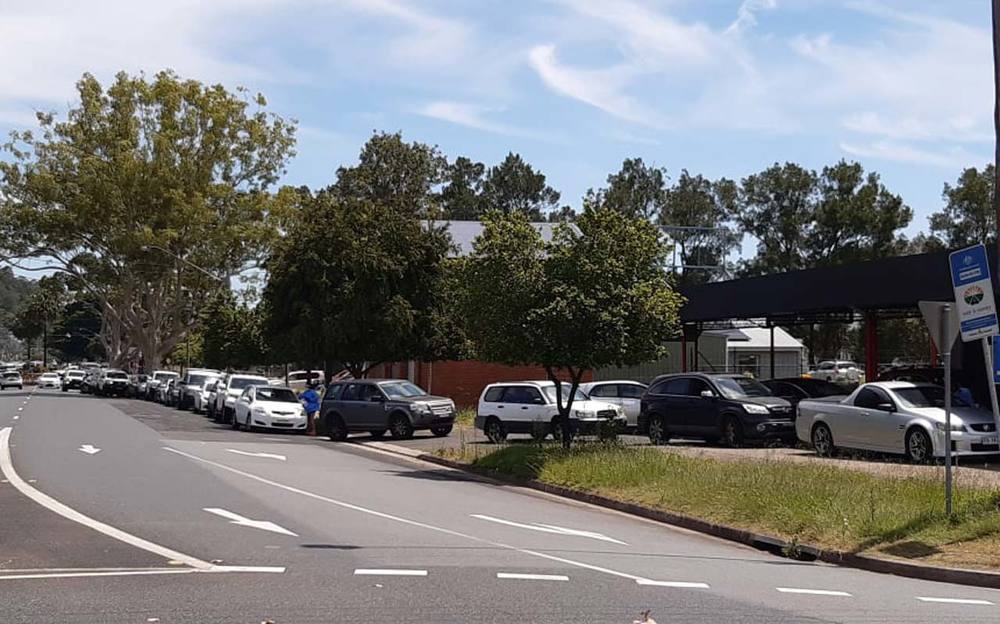Parents told to test after Covid reported in local high school
Liina Flynn
20 December 2021, 4:13 AM
 The line up of cars waiting at the drive through Covid testing clinic on Dawson Street extended to the Woodlark/Uralba Street roundabout today.
The line up of cars waiting at the drive through Covid testing clinic on Dawson Street extended to the Woodlark/Uralba Street roundabout today.Parents of children attending Richmond River High School have received emails directing them to get a Covid test - after a member of the school community tested positive for Covid-19.
The letters, signed by the school’s Principal, were sent to parents of children in Year 7, 10 and 11, informing them that they may be casual contacts of the confirmed Covid case if they were at school on December 13 or 14.
Read more Covid news: New Covid cases in Lismore and one venue of concern in Byron
A double-vaccinated parent (who wished not to be named) with a vaccinated child in one of the affected Year 7 classes spoke to the Lismore App said she received the letters on Saturday.
She said she was informed that as a potential casual contact, she and her children were required to “immediately get a nose and throat (PCR) test and to self-isolate until they receive a negative result”.
“So, I just followed the orders and we went to the drive through testing clinic and got a test,” she said. “We are still waiting for the results.
“The line up at the Dawson Street drive through testing clinic was so long it’s affecting traffic trying to turn onto the Uralba Street roundabout.
“The staff at the clinic are very efficient – and they are working in full PPE gear in this hot weather.
“They are doing such a great job.
“This is the first time I’ve been a casual contact – we’ve been really lucky so far.

Christmas
“But it’s important that we get tested before Christmas.
“I bought rapid antigen tests for the family members too – as we are about to go away for Christmas and it’s important that we don’t spread the virus to vulnerable people and see our hospital system overrun.
“We are living with Covid and this is life now and this is what we will all need to do.”
The letter
The letter to parents also stated that “COVID-19 transmission in school communities has been high due to the close interactions that children and young people have with each other”.
“This is particularly so with the new Omicron variant of concern, which on early information is demonstrating a 10-fold increase in transmission.
“Most people who have been exposed to a person with COVID-19 will test positive within the first 7 days of exposure, with some still likely to transmit for up to 14 days.
“There are around 9% of children who will transmit to other children, with about a third of these during the second week following exposure.
“It is therefore recommended that, as a contact of a person with COVID-19 you should consider your personal and family circumstances and those you may come into contact with in managing the risks associated with potential transmission.
“You should avoid high risk settings (health care, aged care, correctional facilities) where possible, and take extra precautions around vulnerable people including family members, for 14 days after your last exposure.
“You should also have another nose and throat (PCR) test six days after exposure.
"You should also consider undertaking a rapid antigen test before family functions or visiting vulnerable family or friends to minimise the risk of transmission."
Buying rapid antigen tests
If you want to make sure you are not potentially spreading Covid to family members, you can now buy rapid antigen self-tests at pharmacies, supermarkets, and other retail outlets. A pack of five tests can cost about $50 from pharmacies.
The NSW Government advice regarding rapid antigen tests is that are a faster way to test for COVID-19 than traditional polymerase chain reaction (PCR) tests.
But, "they do not replace a PCR test. A PCR test is still the most accurate and reliable test to detect and diagnose COVID-19”.
Further advice about rapid antigen tests states “a positive self-test result means that the test detected the virus, and you are very likely to have an infection and should stay home or isolate for 10 days, wear a mask if you could have contact with others, and avoid indoor gatherings to reduce the risk of spreading disease to someone else.
“A negative self-test result means that the test did not detect the virus and you may not have an infection, but it does not rule out infection. Repeating the test within a few days, with at least 24 hours between tests, will increase the confidence that you are not infected.”


